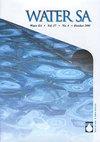Environmental regulatory awareness of freshwater recreational bank anglers in South Africa
IF 1.2
4区 环境科学与生态学
Q4 WATER RESOURCES
引用次数: 0
Abstract
Freshwater recreational angling is growing in popularity internationally. Due to the potential negative environmental impacts, various regulatory systems exist. In South Africa, freshwater recreational angling is regulated through a complex legal framework, consisting of national and provincial legislation dating back to the 1960s. The legislation also relates to historical and current provincial boundaries, adding to the regulatory complexity. Due to this complexity, the question arises whether freshwater recreational bank anglers in South Africa are aware of the regulatory requirements applicable to them. Low levels of awareness could lead to non-compliance, which would suggest an ineffective regulatory system. The aim of this research was thus to determine the environmental regulatory awareness of freshwater recreational bank anglers in South Africa. This was achieved through a literature review of national and provincial legislation, as well as the rules applicable to organised freshwater recreational bank angling. An online survey was completed by 100 members of the South African Freshwater Bank Angling Federation (SAFBAF). The results of the survey indicate that the regulatory awareness of the sample of SAFBAF freshwater recreational anglers is low in certain key areas, such as bag and size limits for specific fish species, catch and release requirements, as well as legal definitions for alien and invasive and TOPS species listings. However, the low level of awareness can be ascribed to the complex regulatory system and not unwillingness of anglers to comply per se. It is recommended that (i) a single consolidated and simplified regulatory system for freshwater recreational bank angling be developed, and (ii) that angling organisational and competition rules be aligned with relevant regulatory requirements, to improve overall awareness and promote higher levels of regulatory compliance.南非淡水休闲银行垂钓者的环境监管意识
淡水休闲垂钓在国际上越来越受欢迎。由于潜在的负面环境影响,存在各种监管制度。在南非,淡水休闲垂钓是通过一个复杂的法律框架来管理的,包括可追溯到20世纪60年代的国家和省立法。立法还涉及历史和当前的省边界,增加了监管的复杂性。由于这种复杂性,南非的淡水休闲银行垂钓者是否意识到适用于他们的监管要求的问题就出现了。意识水平低可能导致不遵守,这表明监管体系无效。因此,本研究的目的是确定南非淡水休闲银行垂钓者的环境监管意识。这是通过对国家和省立法的文献综述以及适用于有组织的淡水休闲银行垂钓的规则实现的。南非淡水银行钓鱼联合会(SAFBAF)的100名成员完成了一项在线调查。调查结果表明,SAFBAF淡水休闲垂钓者样本在某些关键领域的监管意识较低,例如特定鱼类的袋和大小限制,捕捞和释放要求,以及外来和入侵物种和TOPS物种清单的法律定义。然而,低水平的意识可以归因于复杂的监管制度,而不是不愿意遵守本身。我们建议(i)为淡水康乐银行垂钓制定单一的综合及简化的规管制度,以及(ii)使垂钓的组织和比赛规则与相关的规管规定保持一致,以提高整体意识,并促进更严格地遵守规管规定。
本文章由计算机程序翻译,如有差异,请以英文原文为准。
求助全文
约1分钟内获得全文
求助全文
来源期刊

Water SA
环境科学-水资源
CiteScore
2.80
自引率
6.70%
发文量
46
审稿时长
18-36 weeks
期刊介绍:
WaterSA publishes refereed, original work in all branches of water science, technology and engineering. This includes water resources development; the hydrological cycle; surface hydrology; geohydrology and hydrometeorology; limnology; salinisation; treatment and management of municipal and industrial water and wastewater; treatment and disposal of sewage sludge; environmental pollution control; water quality and treatment; aquaculture in terms of its impact on the water resource; agricultural water science; etc.
Water SA is the WRC’s accredited scientific journal which contains original research articles and review articles on all aspects of water science, technology, engineering and policy. Water SA has been in publication since 1975 and includes articles from both local and international authors. The journal is issued quarterly (4 editions per year).
 求助内容:
求助内容: 应助结果提醒方式:
应助结果提醒方式:


